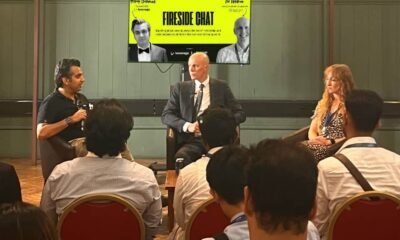Education
GIFT City keeps on giving as UK unis eye Indian opportunities

As part of its “South Asia expedition“, Acumen, which supports international universities from countries including the UK, US, Japan, Ireland, and Canada to expand their presence globally, took 18 universities – seven of them from the UK – to GIFT City, the emerging central business district on the outskirts of Ahmedabad.
The visit, which explored GIFT City “to understand the region’s economic and innovation narrative”, came as three UK universities, Coventry, Queen’s Belfast, and Surrey, announced plans to establish campuses there by 2026.
From interactive discussions on addressing recruitment challenges and strengthening enrolments for both current and future vertical campuses, to exploring innovative partnership models, the initiative sought to “create a channel of communication” between the universities and GIFT City officials for future collaborations, according to Acumen.
“The conversation with the officials was centred on understanding how UK universities view GIFT City, what kind of support they might need, and how to strengthen engagement. They were especially interested in figuring out how to attract the right student groups, how to increase enrolments, and how to ensure that the model appeals to both institutions and learners,” Sutripti Sengupta, senior recruitment adviser, supporting University of Lincoln, told The PIE News.
UK universities can contribute to the expanding vision of GIFT City by collaborating on research and development in fields such as digital finance, smart cities, and climate
Priyanka Gughe, City St. George’s, University of London
The universities, which met with GIFT City officials including IFSCA leaders Dipesh Shah, K. Rajaraman, and Akshat Ganeriwala, also toured the Australian institutions of Deakin University and the University of Wollongong – the only two international campuses established in the region so far.
Both Deakin and Wollongong’s India campuses, which launched their first programs in 2024 and now have around 60 students between them pursuing postgraduate studies in cyber security, business analytics, and financial technology, remain a work in progress as they look to expand their intake, programs, and industry networks in the coming years.
Though the Deakin visit proved eye-opening for UK universities in a positive way, any similar move by a UK institution in GIFT City would likely place greater emphasis on return on investment, an area where Deakin faced challenges, as reported by Careers360.
“The infrastructure at Deakin’s GIFT City campus is impressive – closely replicating the standards seen on international campuses. It reflects a strong commitment to quality and design,” stated Nosika Janbandhu, recruitment advisor, supporting University of Portsmouth.
“However, for UK universities, one of the key considerations when exploring engagement in GIFT City will be the return on investment (ROI) for students. In markets like Australia, where tuition fees are relatively high, the value proposition of a GIFT City campus becomes clearer. For UK institutions, where fees are comparatively lower, the equation is more nuanced.”
While both GIFT City and the University Grants Commission, India’s nodal body for higher education, have their own frameworks for attracting international universities, what makes GIFT lucrative is its comparatively flexible regulatory environment.
The Gujarat-based region has eased rules on 100% foreign currency repatriation and tax exemptions, and benefits from proximity to financial corporations; in contrast, international universities setting up elsewhere in India under UGC norms face stricter oversight on academic offerings, revenue, admissions, and other aspects.
Such regulatory ease could enable UK universities not only to deliver academic programs through branch campuses but also to explore a wider range of student-friendly opportunities.
“More than just a place to receive education, GIFT City is a vibrant ecosystem that combines sustainability, technology, and finance to give students firsthand exposure to sectors influencing the world economy,” stated Annette Vincent Sebastian, senior recruitment adviser – South Asia, supporting Aberystwyth University.
“This provides direct access to internships, research projects, and employment opportunities with top fintech, banking, consulting, and emerging technology companies for students attending UK university campuses in GIFT City.”
Moreover, according to Sengupta, with sustainability and green engineering embedded in UK curricula, graduates from potential India campuses would be “well equipped to drive GIFT City’s infrastructure and innovation”.
“UK universities can contribute to the expanding vision of GIFT City by collaborating on research and development in fields such as digital finance, smart cities, and climate,” stated Priyanka Gughe, senior recruitment adviser, supporting City St. George’s, University of London.
But establishing a presence in the under-construction GIFT City is not without challenges, as the region is still working to attract professionals and organisations to an area that remains only partially developed.
Though more international universities are expected to enter the CBD in the coming years, institutions like Wollongong previously had to delay their commencement in the region due to “severe monsoon weather and waterlogging” and challenges related to campus availability.
As UK universities weigh when and how to establish in GIFT, they are actively engaging with schools and counsellors across Gujarat, one of India’s leading sources of outbound students.
The Acumen visit also led the UK universities to visit schools such as Ahmedabad International, Zebar, Udgam, Adani International, GEMS Genesis, Riverside and Apple Global, where students now aim for programs beyond the traditional choices.
“Students are thinking beyond traditional career paths and exploring areas like filmmaking, sustainability, design, and space science,” stated Sengupta.
“We also noted that students from grades 9-11 are actively exploring summer school opportunities, indicating growing interest in pre-university exposure to international education,” added Janbandhu.
Last month, in association with the British Council, Acumen held a pre-departure session for hundreds of Indian students with 15 UK universities, at a time when the cohort remains the UK’s largest despite a sharp decline over the past year.
“Pre-departure briefings are an excellent way to prepare for what lies ahead, offering practical insights into studying and living in the UK,” stated Alison Barrett MBE, country director, British Council India.
“It was a pleasure to host Acumen’s Pre-Departure Briefing at our Delhi office. The enthusiasm among students preparing to study in the UK was truly inspiring.”
Education
Sparkwork Group Appoints Venkatesh N S as CTO to Drive AI-Powered Personalized Learning at SisuCare Education

SisuCare Education, part of Sparkwork Group, today announced the appointment of Venkatesh N S as Chief Technology Officer (CTO). With over 23 years of experience building and scaling technology across education, healthcare, fintech, and AI-driven platforms, Venkatesh will lead SisuCare’s technology strategy as the company accelerates its mission to deliver trusted, AI-powered, personalized learning for learners and educators worldwide.
Venkatesh’s career has been defined by building systems that empower people and creating technology that makes a difference. Over 23 years, Venkatesh has led large-scale digital transformation initiatives, architected global cloud-native solutions reaching millions of users, and built AI-powered platforms. He holds several U.S. patents in virtualization technologies and has published multiple technical papers on scalable cloud architectures and related innovations, underscoring his commitment to driving innovation in scalable, high-impact technologies. Equally important, Venkatesh is recognized for his leadership in mentoring high-performing teams, nurturing a culture of innovation, and championing human-centered design.
“These values have guided me throughout my journey, from my early days as an engineer to leading global technology teams: innovate with purpose, work together, and always keep the human at the center of the technology,” said Venkatesh. “At SisuCare, we have the opportunity to combine cutting-edge AI with the care and insight of great educators, creating adaptive learning experiences that respond in real time to each student’s needs.”
Strengthening Technology Leadership and Team Excellence
Venkatesh joins SisuCare to strengthen the technology team and provide mentorship, leadership, and strategy. As CTO, he will help shape clear priorities, support team growth, and ensure the work consistently advances SisuCare’s mission and the needs of learners and educators.
“I believe the future of education is not just about delivering content, but about delivering transformation,” Venkatesh added. “If we do this right, we won’t just be improving education, we’ll be reshaping the future of how the world learns.”
“We’re thrilled to welcome Venkatesh to SisuCare,” said Bijay Baniya, CEO of SisuCare & Sparkwork. “Venkatesh brings a rare blend of technical depth, experience operating at scale, and business leadership. His track record of building global, cloud-native AI platforms and his commitment to purposeful innovation make him the perfect leader to advance our vision for truly personalized learning. Together, we’ll empower educators, inspire learners, and set a new standard for responsible AI in education.”
Near-Term Focus Areas Under Venkatesh’s Leadership
- A scalable, cloud-native platform for adaptive, real-time learning experiences
- Responsible and transparent AI: privacy, safety, and inclusion by design
- Powerful educator tools that amplify teaching, assessment, and mentorship
- Global readiness and interoperability with institutions and partners
- A culture of innovation: mentorship, cross-functional collaboration, and rapid experimentation
About SisuCare
SisuCare Education is a California-based nursing education provider approved by the California Department of Public Health (CDPH) to deliver training for Certified Nurse Assistant (CNA) and Certified Home Health Aide (CHHA) programs, as well as offering a Director of Staff Development (DSD) certification. As one of California’s largest self-paced and hybrid CNA training programs, SisuCare meets learners where they learn best, providing opportunities to thousands of students needing access and flexible options beyond a traditional, fully in-person training model. Sisucare Education is part of Sparkwork Group, which offers global enterprise learning and education platforms to businesses. With this appointment, SisuCare strengthens its position at the intersection of education and AI, advancing its mission to prepare learners for the future of work.
Media Contact
Company Name: SisuCare Education (Sparkwork Group)
Contact Person: Bijay Baniya, CEO (Chief Executive Officer)
Email: Send Email
Phone: (213) 537-8360
City: Stanton
State: CA
Country: United States
Website: www.sisucare.com
Education
The Guardian view on free nursery places: risks as well as rewards must be monitored | Editorial

With the change of season, ministers know they must get back on the front foot after weeks during which their opponents have made the political weather. The launch of a new, more generous regime for funding early years education in England should help. The first of September was keenly awaited by hundreds of thousands of working parents of children aged between nine months and four. As of now, they are entitled to 30 free childcare or nursery hours a week.
The education secretary, Bridget Phillipson, is right to stress that this is the biggest-ever expansion of early years provision – described by the Institute for Fiscal Studies as “a new branch of the welfare state”. Equivalent to about £7,500 per year, per child, this is worth more, to most women in full-time work, than abolishing their income tax and national insurance contributions. Working-age parents, particularly those with larger families, have been dealt with less generously by the tax and benefits systems in recent years than under the Blair and Brown governments. The UK has higher childcare costs than most leading economies. So it is right that parents of the youngest children are targeted with support.
Implementation will need to be closely monitored, however. Most of the new funding will flow to private providers. Ms Phillipson is a strong advocate for new nurseries attached to primary schools, but these are small in number. Families are being given additional funding, but not a new public service. The new subsidy will not cover fees in full. Many nurseries face shortages of trained staff, while the number of childminders – usually women working at home – keeps on falling.
While there are many good private and non-profit nurseries, as well as public ones overseen by councils, there is cause for concern about the way that this market has developed. As in children’s social care and special needs education, private-equity owned businesses control a growing number of settings. Last year, academics published research showing that privately run care homes were disproportionately likely to be closed by regulators. In children’s social care, the Competition and Markets Authority judged that private owners were making excessive profits and carrying too much debt, leading to unacceptable risks.
Ministers must ensure that such shocking failures are not repeated in the nursery sector. As a first step, Ofsted inspections should increase from their current six-yearly cycle to a four-yearly one – the same as schools. The current disparity sends a terrible signal about early years’ lowly status.
Another issue is the impact of the changes on poorer children who do not meet the eligibility criteria because their parents do not work or do not meet the £9,518 earnings threshold. While some vulnerable families already qualify for additional childcare, experts are right to worry that the existing attainment gap could grow as a result of a policy that grants extra funding to under‑fives from wealthier homes.
This is the logical but troubling consequence of a policy whose chief aim is to enable parents to work, rather than invest in early years education as an intrinsic good. The hope must be that rules change if these fears are realised, and that “family hubs” – which the Tories brought in after vandalising Sure Start – make a contribution to these families’ welfare in the meanwhile. Ms Phillipson has a lot on her plate. Extra spending on early years is welcome – but it needs proper oversight.
Education
Badenoch urged to ‘come clean’ after doubt cast on Stanford University claim | Kemi Badenoch

Labour and the Liberal Democrats have called for Kemi Badenoch to come clean about her claims of an offer from Stanford University at the age of 16, after former admissions staff said she had described an impossible scenario.
The Labour MP Peter Prinsley has written to the Conservatives leader saying she should lay out the specifics of how the alleged offer came about, given the doubts cast over her story. The Lib Dem education spokesperson, Munira Wilson, said Badenoch risked undermining trust.
Badenoch has defended her claim to have received an offer as a teenager in Nigeria from the elite university to study medicine, sometimes described by her as pre-med, even though the university does not offer that course for undergraduates.
Admissions staff have also said the Conservative leader’s assertion she was offered a place on exam results alone, and was offered a partial scholarship, would not have been possible, with no offers made on that basis.
Jon Reider, the admissions officer during the period Badenoch applied, told the Guardian he had been responsible for international admissions and scholarships and had not offered one to Badenoch.
Badenoch doubled down on Monday, telling reporters she had indeed received offers based on her exam results. “All I will say is that I remember the very day those letters came to me. It was not just from Stanford. I was 16, I had done very well in my SATs,” she said. “But this is 30 years ago, I don’t have the papers, and what the Guardian is doing is reporting on hearsay rather than talking about what the government is doing.”
Multiple former admissions staff and US academics have told the Guardian that Stanford has never made offers based only on SATs – US standardised tests – with no exceptions even for royalty or child prodigies.
Prinsley, a former hospital consultant, wrote to Badenoch to say her claims have been “called into serious question by people in a position to understand the situation, and I would be grateful if you could demonstrate that you have been telling the truth”.
He said the Tory leader should clear up whether she had applied to Stanford and whether a place and financial aid had been offered.
A Labour source said: “Honesty and integrity aren’t optional qualities for those who serve as the leader of His Majesty’s official opposition. The uncertainty surrounding Kemi Badenoch’s Stanford University claims raises important questions that the public deserve to know the answers to.
after newsletter promotion
“Badenoch needs to come clean about what’s happened here and whether she’s been telling the truth to the British people.”
Wilson also wrote to Badenoch saying she should come clean. “If Kemi Badenoch cares about restoring trust, she should start by explaining her own academic record,” she said. “Failing to come clean over these allegations would send a message to the thousands of pupils who just received their exam results that their hard work does not matter and that you can just bluff your way to the top.”
-

 Business4 days ago
Business4 days agoThe Guardian view on Trump and the Fed: independence is no substitute for accountability | Editorial
-
Tools & Platforms3 weeks ago
Building Trust in Military AI Starts with Opening the Black Box – War on the Rocks
-

 Ethics & Policy1 month ago
Ethics & Policy1 month agoSDAIA Supports Saudi Arabia’s Leadership in Shaping Global AI Ethics, Policy, and Research – وكالة الأنباء السعودية
-

 Events & Conferences3 months ago
Events & Conferences3 months agoJourney to 1000 models: Scaling Instagram’s recommendation system
-

 Jobs & Careers2 months ago
Jobs & Careers2 months agoMumbai-based Perplexity Alternative Has 60k+ Users Without Funding
-

 Funding & Business2 months ago
Funding & Business2 months agoKayak and Expedia race to build AI travel agents that turn social posts into itineraries
-

 Education2 months ago
Education2 months agoVEX Robotics launches AI-powered classroom robotics system
-

 Podcasts & Talks2 months ago
Podcasts & Talks2 months agoHappy 4th of July! 🎆 Made with Veo 3 in Gemini
-

 Podcasts & Talks2 months ago
Podcasts & Talks2 months agoOpenAI 🤝 @teamganassi
-

 Mergers & Acquisitions2 months ago
Mergers & Acquisitions2 months agoDonald Trump suggests US government review subsidies to Elon Musk’s companies



















